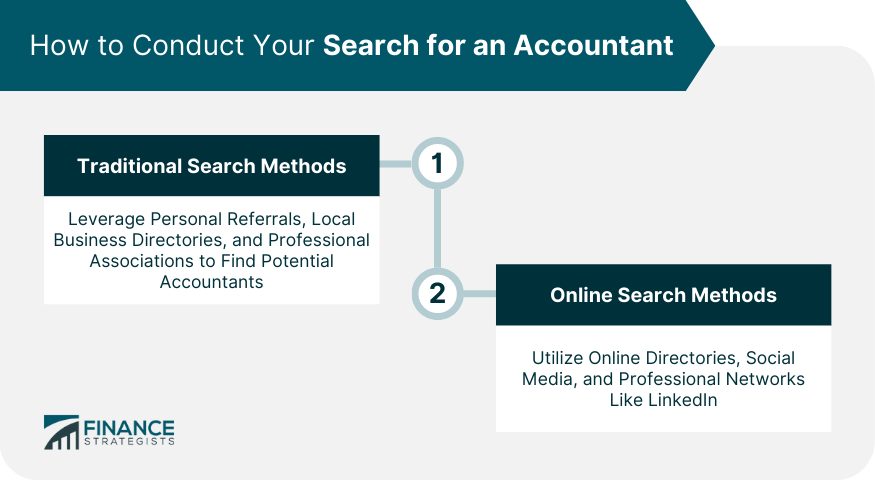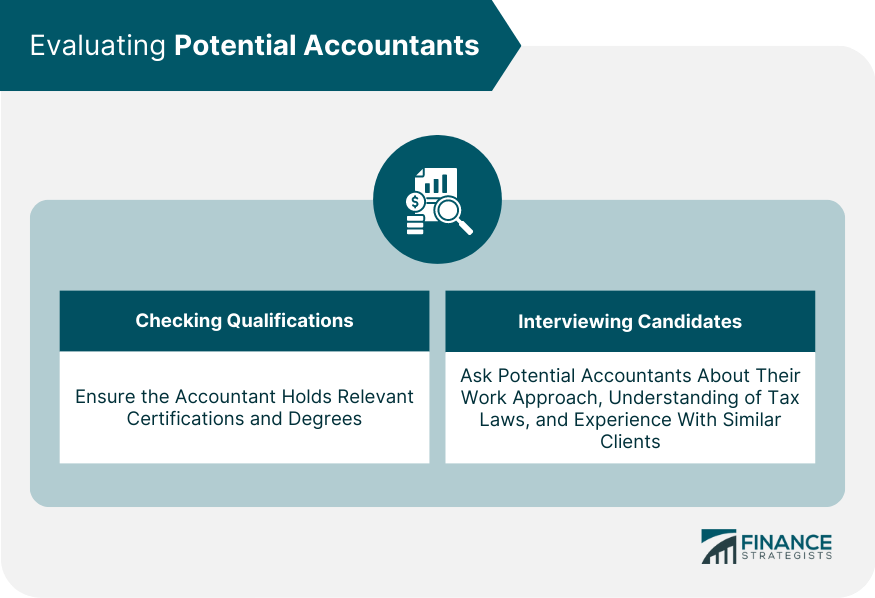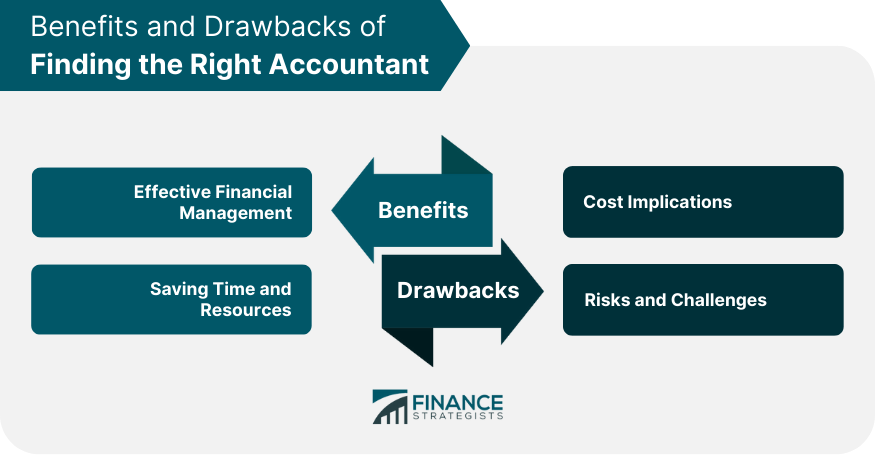Finding an accountant requires a well-structured approach. Start by identifying your specific accounting needs, such as tax preparation, financial planning, or auditing. Next, search for accountants using traditional methods like referrals, local directories, and professional associations, or online platforms like directories and social networks. Upon finding potential candidates, evaluate their qualifications and experience relevant to your needs. Also, consider conducting an interview to assess their professionalism and compatibility with your financial goals. Understand the costs involved and weigh them against the potential benefits. Once satisfied, finalize the contract ensuring it covers your requirements, and establish a communication protocol. Regular reviews and open communication are key to a fruitful long-term relationship. Personal accounting needs can vary based on individual financial circumstances. However, common requirements include income tax preparation and personal financial planning. Accountants can provide expert advice on deductions, credits, and tax-saving strategies. They can also guide you in areas such as retirement planning, investment strategies, and managing personal debt. For businesses, the services of an accountant extend to business tax preparation, financial planning, and auditing. An accountant can help a business with payroll, bookkeeping, and timely tax filings to avoid penalties. They can also assist with financial forecasting to help the business plan for future growth and stability. Audit services include ensuring the business’s financial statements are accurate and compliant with laws and regulations. Traditional methods of finding an accountant include leveraging personal referrals and seeking recommendations from local business directories or associations. Word-of-mouth referrals can be particularly beneficial as they provide firsthand reviews of the accountant's services. The digital age provides an alternative platform for finding accountants. Online directories offer a plethora of choices with reviews and ratings to guide the decision. Social media and professional networks like LinkedIn can also be useful in finding an accountant, offering a mix of personal and professional reviews. When evaluating potential accountants, one of the first steps is to check their qualifications. The accountant should hold relevant certifications and degrees. A Certified Public Accountant (CPA) will have more extensive training than a regular accountant. Additionally, the accountant should have experience in the specific area of your need, whether personal or business accounting. The interview process allows you to ask potential accountants important questions about their approach to work, their understanding of tax laws, and their experience with similar clients. Observing their communication skills and problem-solving approach can provide clues about whether they will be a good fit for your needs. The right accountant can be instrumental in facilitating effective financial management. They can guide budgeting processes and offer valuable insights for financial forecasting. Their expertise in tax laws can also improve tax planning and ensure compliance, potentially saving significant money in penalties. An efficient accountant can free up time spent on managing finances, allowing individuals or businesses to focus more on their core activities. Additionally, the long-term benefits of effective financial management can lead to substantial savings, contributing to overall resource efficiency. One of the main deterrents to hiring an accountant can be the costs involved. Fee structures vary widely, and it's essential to understand these before committing. It's also crucial to assess whether the potential benefits of hiring the accountant outweigh these costs. While accountants can provide valuable financial management, there can be a risk of becoming too dependent on their services. Additionally, entrusting sensitive financial data to an outsider brings up challenges related to security and confidentiality. Once a suitable accountant is found, the next step is to finalize the contract. This involves understanding the terms of service, including the scope of work, the fee structure, and the schedule for reporting and communication. Negotiating these terms can help set up a comfortable working relationship. Securing the services of an accountant is often a long-term commitment. Regular performance reviews can ensure the relationship remains beneficial. Furthermore, being proactive in communicating changes in financial circumstances or needs can help the accountant better serve their clients. Identifying personal or business accounting needs forms the foundation of finding the right accountant. Traditional and online methods, from referrals to directories, can help in this search. As you evaluate prospects, check their qualifications, experience, and conduct interviews for a personal assessment. Understand that while the right accountant can greatly assist with financial management and save time and resources, you need to consider cost implications and potential risks. Once you've found a suitable accountant, finalize a contract outlining the terms of service, and foster a proactive, communicative relationship to ensure continued service quality. Regularly review their performance and communicate any changes in your financial landscape. Though finding an accountant may seem daunting, a strategic approach can lead to a beneficial long-term partnership.How to Find an Accountant
Understanding Your Accounting Needs
Personal Accounting Needs
Business Accounting Needs
How to Conduct Your Search for an Accountant
Traditional Search Methods
Online Search Methods

Evaluating Potential Accountants
Checking Qualifications
Interviewing Candidates

Benefits of Finding the Right Accountant
Effective Financial Management
Saving Time and Resources
Drawbacks of Finding an Accountant
Cost Implications
Risks and Challenges

Securing the Services of Your Chosen Accountant
Finalizing the Contract
Long-Term Relationship Management
Conclusion
How to Find an Accountant FAQs
You should look for relevant certifications and degrees. A Certified Public Accountant (CPA) generally has more extensive training than a regular accountant. Make sure the accountant has experience in your specific area of need, be it personal or business accounting.
An efficient accountant can handle your financial management, freeing up your time for other core activities. They can guide budgeting and financial forecasting, ensure tax compliance, and potentially save you money by avoiding penalties.
Traditional methods include personal referrals, local business directories, and associations. Online methods encompass directories, social media, and professional networks like LinkedIn. Both offer a mix of personal and professional reviews to guide your decision.
Some possible drawbacks include the costs involved, which can vary widely, and the risks related to becoming overly dependent on their services. You should also consider challenges related to the security and confidentiality of your sensitive financial data.
The contract establishes the terms of service, including the scope of work, fee structure, and communication protocol. It's vital to understand these terms and negotiate if necessary to set a comfortable working relationship.
True Tamplin is a published author, public speaker, CEO of UpDigital, and founder of Finance Strategists.
True is a Certified Educator in Personal Finance (CEPF®), author of The Handy Financial Ratios Guide, a member of the Society for Advancing Business Editing and Writing, contributes to his financial education site, Finance Strategists, and has spoken to various financial communities such as the CFA Institute, as well as university students like his Alma mater, Biola University, where he received a bachelor of science in business and data analytics.
To learn more about True, visit his personal website or view his author profiles on Amazon, Nasdaq and Forbes.















